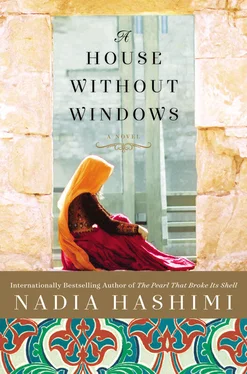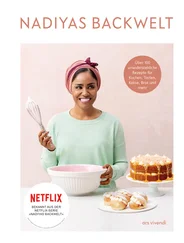“That’s not necessary,” she said abruptly. “I’m glad the boy’s family has come around. For you and your baby.”
Mezhgan’s eyes twinkled. From behind the fence, her mother called her name and waved her over. She shook her head at her daughter’s giddiness. There was much that still needed to happen. There had to be a formal nikkah . Until her daughter was married in the eyes of Islam, she should not rejoice. A premature celebration would only invite misfortune.
Mezhgan wasted no time. Her mother left the prison that day with even stricter instructions directed, this time, by her own daughter. She needed a proper wedding dress. The clothes she’d been wearing in the prison would not do for such a momentous occasion. When she and her lover, Haroon, visited the judge to update him on the status of their relationship, she pushed closer to him, whispering honey-coated words of devotion.
“I knew we were meant to be together. I’ve been thinking of nothing but you,” she cooed. “And now we need to plan our engagement.”
Her shackled fiancé was sent off with a list of supplies needed to mark this momentous occasion behind bars. He would need to relay the list to his parents, who should deliver the items as promptly as possible so that Mezhgan could make plans. She handed him a folded sheet of notebook paper that bore her childish scrawl: chocolates for the guests, sugared almonds, pink lipstick, and money to her mother for any other expenses.
Mezhgan walked with the confidence of a woman adorned in gold. Latifa looked bored. The promise of a nikkah took all the sport out of their banter.
Haroon’s mother and father, along with Mezhgan’s anxious parents, arrived on the day the young couple were to sign their nikkah . They nodded at one another briefly but said nothing else. Mezhgan’s father was still too angry and ashamed to string more than two words together, and her mother was afraid she would be confronted for what she’d done with the thread and the feather. She pulled at her sleeves, a nervous twitch.
The parents, bride, and groom were led into a small courtroom with three rows of wooden chairs. The groom, wearing white pantaloons and a tunic, was escorted by two guards with distinctly unfestive handguns on their hips. Mezhgan, early in her second trimester, beamed in a silver brocade head scarf and a billowy emerald dress that she’d cinched at her still delicate waist. The hem of the dress fell to her calves and covered her ivory, satin pantaloons. She smiled coyly at her new fiancé. Her reluctant mother-in-law turned away. She’d agreed to this arrangement but only because she’d not wanted her son to serve the remaining eighteen months of his sentence.
How disappointed she was to have raised a fool for a son.
The young couple had their handcuffs released so that they could sign their names on the nikkah contract that bound him and Mezhgan as husband and wife. It was the most important piece of paper Mezhgan had ever touched, and she took her time penning the curves and dashes of her name. Before he was led away by the guards, Mezhgan dreamily exclaimed they would have a beautiful wedding party once they were released. He shook his head and sighed with amusement. Her eyebrows shot up as he was led away. His dainty bride had not been joking.
IN THE PRISON, NEWS OF MEZHGAN’S NIKKAH BROUGHT A BUZZ OF activity. It passed from cell to cell in whispers, nods, and exaggerated stories. Some scoffed, some giggled, and some were just a bit fearful. But each and every woman behind those locked doors wondered if the rumors of a sorceress among them might just be true. Soon they were lining up at the dented door of Zeba’s cell, their newly found hope stoking the wildfire she’d set off within the cold walls of Chil Mahtab.
GULNAZ STOOD BY THE FRONT DOOR OF THE PRISON AND watched as a young man slid his legs out of the backseat of a taxi, struggling to keep the strap of a bag on his shoulder as he slipped the driver a few bills.
He was in a rush to get to the prison — as if his hurrying would save something more than a moment of time. He pushed the taxi door closed and raised his hand in thanks to the driver who had already turned his attention back to the radio dial.
Oh, Rafi. Did you find a lawyer to defend your sister or a playmate for your sons?
Gulnaz wished she’d paid closer attention to Rafi when he was younger. He meant well, but his efforts were childish.
The man was walking quickly, his messenger bag bouncing playfully against his hip. He checked his watch, and Gulnaz sighed with renewed disappointment.
Time is not the problem, child. Time is all we have.
This was the baby-faced lawyer Zeba had told her about — the one whose expensive cologne and crisp clothes could not mask the scent of inexperience. Zeba had been right to hang her head.
When he reached the shaded entrance, Gulnaz took a step forward. Yusuf put a hand on his chest and nodded in respectful greeting. He reached for the door’s handle.
“You are my daughter’s lawyer,” Gulnaz declared.
Yusuf paused, caught off guard.
“Excuse me?”
“You are Zeba’s lawyer.”
“Yes, I am,” he said cautiously, his hand still resting on the metal handle. “I’m very sorry. You are. .”
“Mother of the prisoner.”
He stopped abruptly, retreating a step and turning to face Gulnaz. He felt himself pulled by the crystalline green of her eyes.
How exotic, he thought, feeling fully Western as it occurred to him. These were the kinds of eyes that foreign photographers would plaster on magazine covers. His Afghan senses returned, and the sparkle of Gulnaz’s eyes also brought a chill to his bones.
Bewitching. His mother would have been muttering prayers under her breath if she were caught under the gaze of such eyes.
Yusuf reined in his thoughts.
“Pleasure to meet you. You’re here to visit your daughter?”
“I sat with her for a time.”
“How is she doing today?” It felt like the right thing to ask though he wasn’t clear why he was spending time with pleasantries. Surely there were more pressing things to ask Zeba’s mother.
Gulnaz must have agreed. She ignored his question and asked a more relevant one.
“Has she spoken much with you?”
“Well, she’s been reluctant to say much of anything so far,” Yusuf replied slowly. The family wasn’t paying a lot for his services, but they were paying something. He had disappointingly little to show for the case thus far.
“She knows better,” her mother confirmed. “My son-in-law’s body was found in his home. That means only that he’s dead — not that she killed him. Tell me your plans.”
Yusuf shifted his weight and moved the strap of his bag to his left shoulder.
“Well, for one, I’m going to be traveling to her village. I need to speak with the neighbors, people who knew her and her husband. I’ve got to see where it happened, especially since she’s not saying much. I’m going to do my job, Khanum. Your daughter seems to think she’s a lost cause, but I don’t see it that way. There’s always a way to. .”
“People don’t speak badly of the dead. Do you really think you’ll find the truth there?”
“It is a starting point.”
“You don’t have a plan,” Gulnaz surmised.
“This is a complicated case, mostly because of how uncomplicated it looks. It’s not going to be simple to argue for her innocence.” Yusuf sounded defensive and he knew it.
“Innocence is a luxury not everyone can afford.”
Whether Gulnaz was referring to prisoners bribing their way out of convictions or her daughter’s role in Kamal’s death, Yusuf could not tell.
Читать дальше











